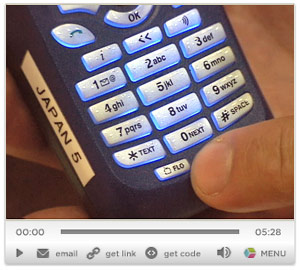US and Japan to Lead Mobile TV Market
 SoftBank announced that it has established a new company, Mobile Media Planning Corp., which aims to conduct technical research on MediaFLO and plan new services utilizing such technology. Developed by QUALCOMM, the system enables distribution of multichannel broadcast optimized for mobile communications, including Clipcast, and distribute digital terrestrial broadcasts to mobile terminals and other devices. This technology is considered as one of the three major technologies following satellite broadcast and 1Seg broadcast, and it enables real time broadcast of 20 channels on one TV channel portion of frequency band (6MHz). We interviewed MediaFlo’s Ali Zamari during the recent Wireless Japan trade-show in Tokyo.
SoftBank announced that it has established a new company, Mobile Media Planning Corp., which aims to conduct technical research on MediaFLO and plan new services utilizing such technology. Developed by QUALCOMM, the system enables distribution of multichannel broadcast optimized for mobile communications, including Clipcast, and distribute digital terrestrial broadcasts to mobile terminals and other devices. This technology is considered as one of the three major technologies following satellite broadcast and 1Seg broadcast, and it enables real time broadcast of 20 channels on one TV channel portion of frequency band (6MHz). We interviewed MediaFlo’s Ali Zamari during the recent Wireless Japan trade-show in Tokyo.
Mobile Media Planning plans to provide digital-tv broadcast distribution services for mobile terminals and other devices utilizing such technology for the development of mobile communications business of the SOFTBANK Group. Also, Mobile Media Planning will work on the study of technical potential of MediaFLO, by participating in the activities organized by external parties such as the VHF/UHF-band efficient use working group in Information and Communications Council, which discusses the proposal of multimedia broadcast technology including MediaFLO, and FLO Forum where supporting enterprises from around the world, such as QUALCOMM, participate.

